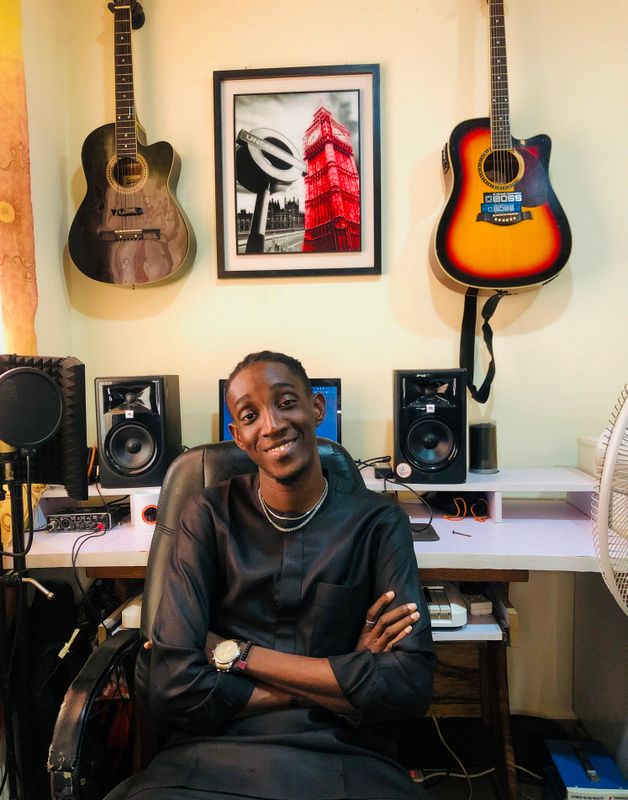“When you are rolling in agony, yeah, they call it a crisis. But your bones are on fire, and you can’t even describe it. They say, ‘We will try to control the fever; oh, I think you’re dehydrated; we’ll check your breathing; you need some oxygen’, but I just want the pain to go away.”
These are some of the lyrics in Excel Praiseworth‘s ‘Sickle Song‘, streamed almost 7,000 times on Spotify alone.
Excel, who lives with his family in Abuja, Nigeria, was diagnosed with sickle cell anaemia at nine months old.
According to the Centre for Disease Control and Prevention (CDC), more than 300,000 babies are born globally with sickle cell disease each year. Out of this total, approximately 225,000 infants are born in Africa, and Nigeria alone bears 66 per cent of this burden within the region.
“I am a sickle cell warrior. I grew up with some scars on my body. I have this huge scar on my right leg from a surgery I had when I was nine months old because the bone on my right leg was rotten,” said Excel.
Excel was referring to osteomyelitis, an infection of the bone caused by sickle cell anaemia that manifests through extreme pain, swelling, fever, and an increased flow of inflammatory markers. Timely identification and precise diagnosis of osteomyelitis are crucial, as this enables the implementation of an immediate treatment plan to prevent bone destruction and deformity.
After his surgery as an infant, Excel remained largely free from pain until, as a 15-year-old, he started experiencing a sickle cell crisis.
“Crisis are episodes of extreme pain, a non-stop banging of intense pain. It’s easy to undermine this pain if you can’t imagine it.”
Sickle cell anaemia results from “mutated haemoglobin in the blood, causing red blood cells to contort into a sickle shape. The cells die early, leaving a shortage of healthy red blood cells that can block blood flow, causing pain (sickle cell crisis). Infections, pain, and fatigue are symptoms of sickle cell disease. Treatments include medication, blood transfusions, and rarely a bone marrow transplant.”
Despite his struggles with the disease, Excel realised that not many people were talking about sickle cell. He was determined, however, to find a way to raise awareness, particularly as its hereditary nature means the disease can be stopped in its tracks.
“I didn’t want to do what everyone else is doing—street campaigns, radio shows, talks, and all that—I wanted to do something else, something creative that could resonate with everyone else.”
Excel’s journey of musical exploration became personal pain therapy. With each strum of the guitar, each touch of the piano key, and each lyrical composition, he found relief from physical and emotional distress.
“I decided to use music as my advocacy because I am a musician among the other things I do, and I feel that music is therapeutic; it is a safe space. Whenever I feel pain, I resort to music,” he said.
Through his music, he continues to break barriers, raise awareness, and create a lasting impact and comfort for those affected by sickle cell anaemia.
“The idea of the songs is to provide comfort; it is a song you can own as a sickle cell warrior,” he said.
For over seven years, Excel has been using his music as a means to not only convey the challenges of sickle cell anaemia but also to inspire and uplift others who are fighting the same battle. He wants his music to become a beacon of strength for individuals battling genetic blood disorders.
According to psychologist Mbasiti Jesse, many studies have been carried out that prove that music can relieve pain and boost morale.
“Music can be used in pain management. They may have analgesic effects,” he said.
An avid fan, Bidemi Alade says Excel’s song gives her a glimpse of what sickle cell patients go through.
“The words of his song paint a picture and remind me of a time I was critically sick. I can’t imagine that they go through this pain more often, and it is non-stop until the doctors can manage it. Listening to his songs makes me care more about sickle cell warriors,” she said.
Alade also said Excel’s lyrics have reminded her to choose a marriage partner carefully. Health practitioners discourage marriage between two individuals with the genotype SS (homozygous for sickle cell anaemia).
Dr. Daniel Meshack from the Jos University Teaching Hospital explained that the safest way was for everyone to know their genotype and avoid marriages between an SS and an SS. He also discourages marriage between genotypes AS and AS.
“I am envisioning a time when sickle cell anaemia will end because of the information people are getting these days,” he said.
“Sickle cell patients are called warriors because they are most often in a battle with excruciating pain,” said Nanji Pricilla, another sickle cell warrior in Jos.
She faulted ignorance, carelessness, and “blind love” for the continued prevalence of sickle cell and encouraged young people to know their genotype before dating or eventually getting married.
To reinforce this, the Nigerian National Assembly passed a bill to make genotype testing compulsory for intending couples in 2017.
Although the bill has not yet been passed into law, many secondary schools in Nigeria require students to undergo this health checkup before enrollment. Additionally, in many churches throughout Nigeria, taking this test has become a prerequisite for marriage, along with other requirements.
Story Credit: Dorcas Bello for Bird Story Agency
Share your story or advertise with us: Whatsapp: +2347068606071 Email: info@newspotng.com
















